Disclosure: Meeple Mountain received a free copy of this product in exchange for an honest, unbiased review. This review is not intended to be an endorsement.
Border Reivers: Anglo-Scottish Border Raids, 1513-1603 has a terrific theme. This GMT game for 1-6 players takes place on the border of England and Scotland, and concerns itself with the activities of the border raiders who populated the region. English and Scottish alike, the border reivers stole livestock, nursed grudges, and generally made life for one another difficult.
This is delightful fare for GMT. So fully does Border Reivers commit to its pastoral setting that it comes with sheep and horse meeples. This is GMT-does-Agricola, and it is absolutely charming. Well, I say “charming.” There’s an awful lot of pummeling one another for Border Reivers to be charming.
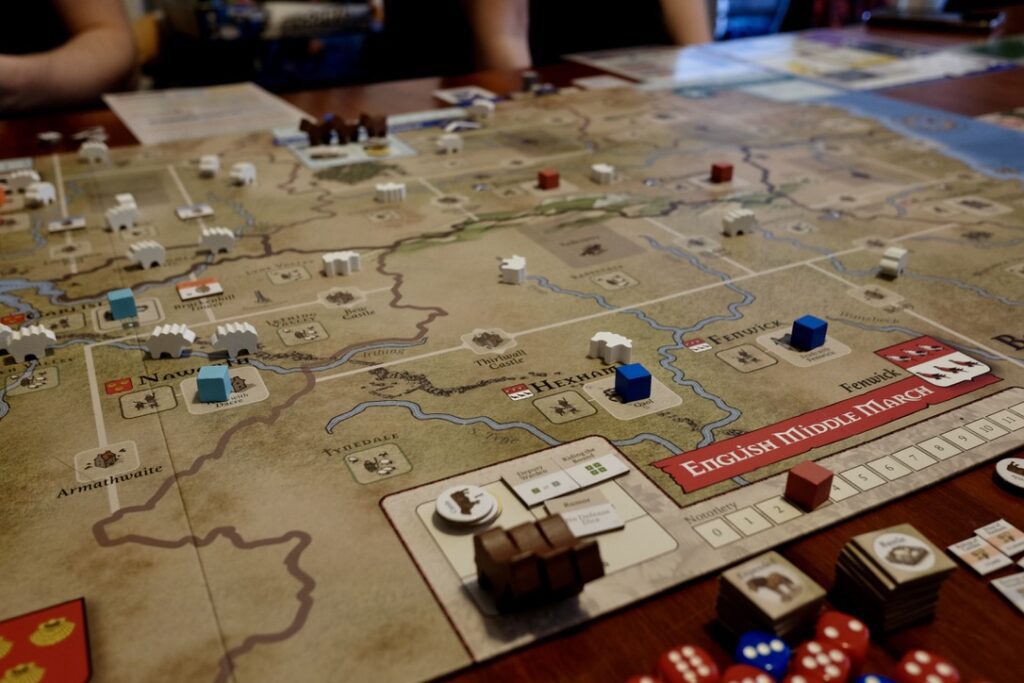
Sheer Madness
Each of the three rounds is divided into four seasons. During the summer, players draft cards to build alliances, gain resources, and lay traps that can be sprung during subsequent seasons. Autumn involves bookkeeping, when players check that they’re not holding too many cards or in possession of too many horses. Winter is the most involved season, when all of the attacking occurs, so we’ll come back to that in a moment. Spring is a maintenance phase, resetting for the next summer.
About that winter: There are two attack phases each winter, performed back to back. Players choose and put down cards that dictate the form(s) of attack available to them this round and the regions in which they can attack. The board is divided into six marches, three on each side of the border, along with a small region known as the Debatable Land, which is really just for getting some easy sheep. Once all players have put down their cards, they are simultaneously revealed.
At this point, some players will have cards and abilities that allow them to increase their Notoriety in the various marches. Notoriety, which the manual could do a somewhat better job of explaining, is the primary source of victory points over the course of the game. Players also receive an attack bonus when they act in marches where they have a higher Notoriety than others. Because of that, there’s an element of bluffing to where you do or don’t increase your Notoriety.
Then, in a turn order that runs counter to the current ranking on the scoreboard, each player announces their specific target within the areas their card allows them to act. You can choose to Raid, Feud, Gaolbreak, or Battle, depending on what you hope to accomplish. Successful raids gain you sheep while increasing the intensity of your feud with the targeted family. Feuds can yield massive victory point swings when successful. Gaolbreaks net you horses, and deprive your opponent of victory points they’d receive for having a member of your family in jail. Battles, which appear randomly from the event deck, dole out bonuses to the winning side.
How do all of these battles work? Dice. Lots and lots of dice. How exactly the amount of dice is calculated will change from one type of attack to another, but it always comes down to dice. In the first round, a particularly aggressive attack might have three or four dice at its disposal. By the Winter of the second round, players are chucking 8-10 dice regularly. Border Reivers is nothing if not silly and swingy. Bad rolls will lose you the game no matter how well you play.
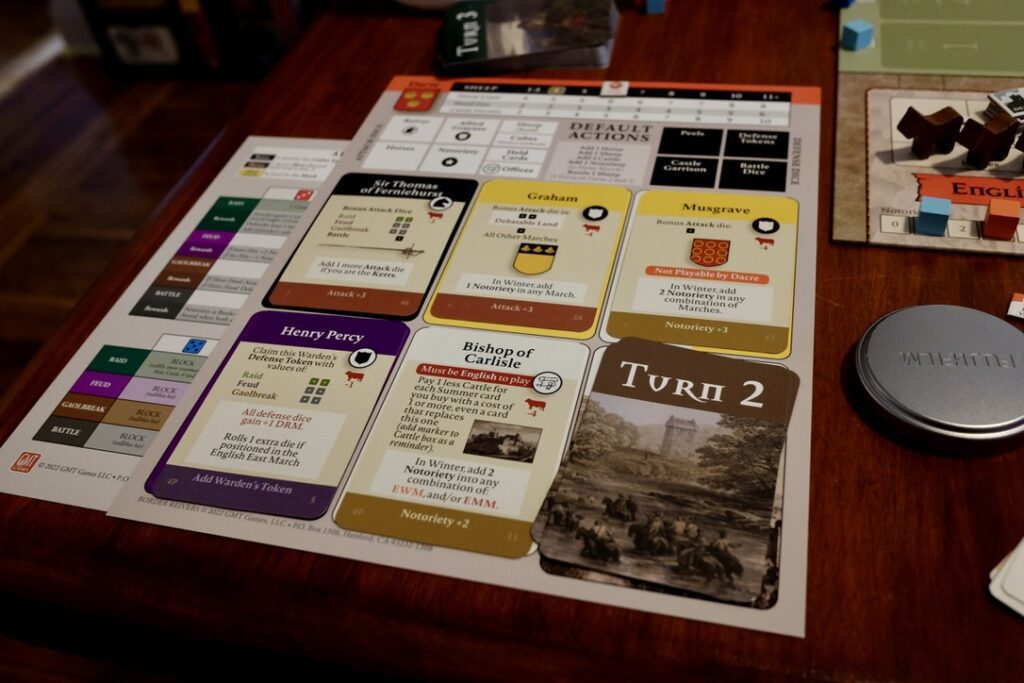
Balance
Despite that, Border Reivers appears to be remarkably balanced in aggregate. It takes a plethora of steps to help those who are falling behind. The last place player at the end of each round gets to take a card from the discard and play it for free. The last place player also gets to choose their targets first for the next round, a big advantage when highly contested spots appear. I wouldn’t go so far as to say that Border Reivers is a point salad, but the points come from enough disparate places that you’ll find yourself gaining something somewhere every round.
More than that, players can’t target a space that’s already been targeted this round, and you don’t get your target cards back after they’re played. That means a player who gets hammered early will have plenty of space to relax later. Nobody can get snowballed into a last place finish. Dogpiling is simply not mechanically possible beyond a certain point.
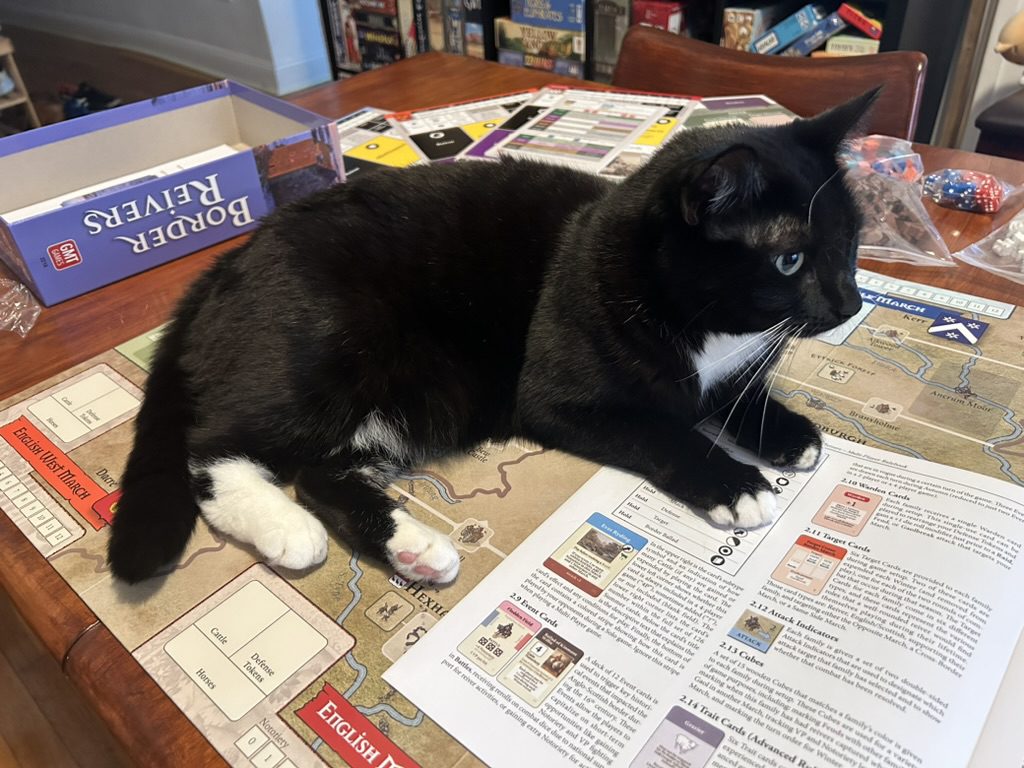
Auf dem Grenze
I have long-term concerns. There isn’t much variety in how you can play Border Reivers, nor much room for self-expression in how you approach it. After only two or three plays, it feels on rails. Actions other than raids don’t make sense in the early game, which means experienced players will more or less raid up in the beginning, and feud/gaolbreak towards the end.
On the other hand, how many plays do you expect to get out of a game for 4 or 6 players—there are modes for 1-3, but…no—that takes two or three hours to play once everybody knows the game cold? Maybe the lack of flexibility isn’t a problem so much as an incidental issue that’ll almost never manifest into real-world problems.
And it is a wonderful setting to bask in. We put on traditional English folk music during the Summer and Scottish bagpipes during winter. We read about the Devil’s Beef Tub. One of my friends sat down to their randomly assigned faction only to discover that she was playing as her actual ancestral family. It’s some of the most fun I’ve had around playing a historical game in ages. The problem is that all of the fun—and this has only felt more true as I’ve had time to reflect on it—is around rather than through the game.
At the end of it all, what Border Reivers is is good, silly fun. Do I want a game whose primary attribute is silliness to take 45 minutes to learn and several hours to play? No. I have That’s Not a Hat for that. This is the sort of rules burden that can, nay, must lead to much better games.
Still, even if Border Reivers doesn’t convince me as a decision space, and it doesn’t, I’ve had a good time playing. Everyone hangs on for dear life with every die roll, even if they aren’t invested in the outcome. There’s shouting, there’s laughing, there are dramatic reversals, and at the end of the day, hey, you get to raid some sheep. Isn’t that charming?
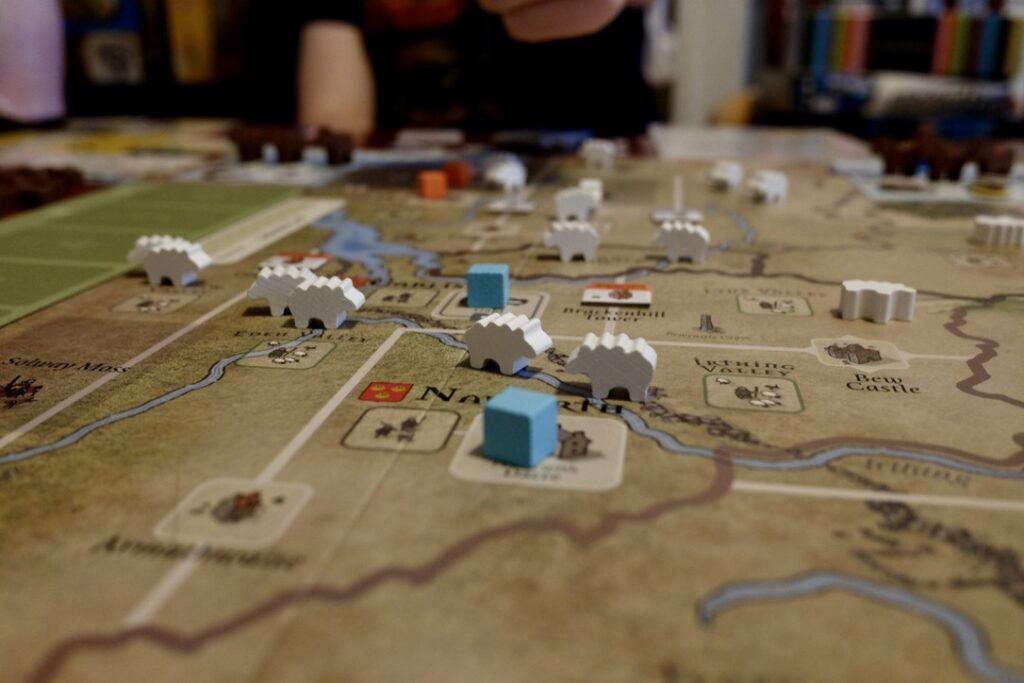




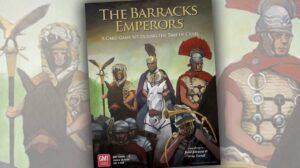






Great review! On a side note, I think far more reviewers should show a cat for scale. Bananas are so last week…